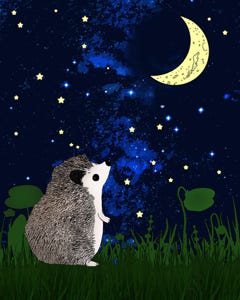
East Dean and Friston
Hedgehog Street Stargazing

Stargazing Evening - Saturday September 28th
Celebrating our Dark Skies
East Dean and Friston Hedgehog Street Group are pleased to announce that the Seven Sisters Astronomy Group has offered to host a stargazing evening at the Crowlink car park on Saturday 28th September from 7.30pm, subject to clear weather conditions. They will be bringing several telescopes so that we can hopefully view Saturn and deep sky objects as there will be no bright moon.The event will be free.
Just to get an idea of numbers please email sue.pettifor@icloud.com or phone
01323 422175, also you can check if the event is going ahead.
We are pleased that we’ve had several recent sighting of hedgehogs in our village. These sightings highlight the importance of continuing to create a suitable environment for nature. As trends change there seems to be a tendency to illuminate driveways and gardens at night. This can have a devastating effect on nature so we are encouraging residents to avoid external lighting apart from where essential.
Please come along and enjoy an evening of stargazing with Seven Sisters Astronomers. At our last event a couple of people asked about giving a donation. If anyone would like to then donations can be made to East Sussex WRAS who rescue and rehabilitate hundred of hedgehogs each year.
www.wildlifeambulance.org/donate
Hope to see you there
Sue Pettifog (ED&F Hedgehog Street)
An article by the Royal Horticultural Society highlights the detrimental effects of artificial light on wildlife and offers advice on how to reduce the impact. Light pollution from inappropriately positioned security lighting is often the worst culprit but all forms of artificial lighting (including LEDs and halogen) have an impact:
• Nocturnal insects use natural light sources, such as the moon, and can become disorientated by artificial light, increasing their risk of predation and reducing their efficiency as nocturnal pollinators. Light proves to be fatally attractive for hundreds of insects each night.
• Many bat species avoid lit areas and although some take advantage of the accumulation of insects at artificial lights to hunt, it opens them up to the risk of predation.
• Lights may temporarily blind some animals e.g. frogs, and deter others e.g. hedgehogs.
• Birds are disturbed from sleep by sudden lighting. Owls find hunting more difficult and birds that start migration flights at night can become disorientated.
• Shorter periods of night time darkness mean less time for foraging for crepuscular (dawn/dusk) or nocturnal species.
• Under polarised light mayflies and other aquatic insects can mistake impermeable non-aquatic surfaces for water and lay their eggs there, where they will fail.
Since artificial lights disrupt natural behaviour it's important to retain dark areas and question whether lighting is needed. For when deemed essential:
• Position as low as possible and aim them downwards, not up and out.
• Fit hoods over the light to reduce light pollution of the night sky.
• Turn off when not in use. Use carefully positioned PIR motion sensors.
• Choose low-intensity lighting and warmer hues (warm white, yellow or amber).
More information is on the RHS website. https://www.rhs.org.uk/wildlife/garden-lighting-effects-on-wildlife
If you would like to come along, dress up warmly and bring a flask! It would be helpful to get an idea of numbers so if possible email to let us know you will be there. As the event is weather dependent, check with us on the day to confirm the event is going ahead.
Hope to see some of you there.
Sue Pettifor
Hedgehog Street
Home